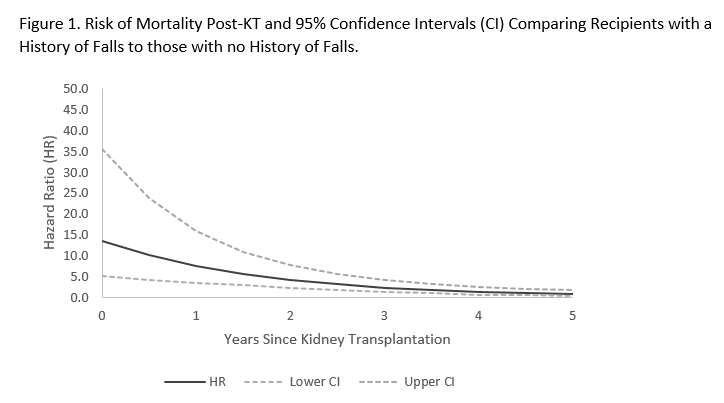Poor Outcomes in Kidney Transplant Candidates & Recipients with History of Falls
1Johns Hopkins, Baltimore, MD, 2Michigan Medical Center, Ann Arbor, MI
Meeting: 2019 American Transplant Congress
Abstract number: B246
Keywords: Age factors, Graft failure, Mortality
Session Information
Session Name: Poster Session B: Kidney Living Donor: Long Term Outcomes
Session Type: Poster Session
Date: Sunday, June 2, 2019
Session Time: 6:00pm-7:00pm
 Presentation Time: 6:00pm-7:00pm
Presentation Time: 6:00pm-7:00pm
Location: Hall C & D
Session Information
Session Name: Young Investigator Oral Communication Session
Session Type: Concurrent Session
Date: Monday, June 3, 2019
Session Time: 4:30pm-6:00pm
 Presentation Time: 5:30pm-5:40pm
Presentation Time: 5:30pm-5:40pm
Location: Room 208
*Purpose: In patients with ESRD, serious fall injuries (e.g. fractures) are associated with decreased chance of listing or transplantation. It is likely that KT candidates and recipients have high frequency of injurious and noninjurious falls, and that falls are associated with access to KT in candidates and post-KT poor outcomes in recipients.
*Methods: We studied a multi-center cohort of KT candidates (n=3,666) and recipients (n=770) from 1/2009 to 1/2018. History of falls (in the past 6-months) was self-reported at evaluation (KT candidates) or admission (KT recipients). Using Cox proportional hazards and Poisson regression, we estimated time to listing, waitlist mortality, and transplant rate by any falls and recurrent falls (>1 fall) in candidates, and risk of mortality, all-cause graft loss, and longer length of stay (LOS) in recipients.
*Results: Of 3,666 KT candidates followed for a median of 2.1 years (IQR=1.1,3.6), average age was 54.4(SD=13.5), 38.1% were female, 45.9% were black; 16.3% had at least 1 fall prior to KT evaluation, and 6.5% had recurrent falls. History of any falls was associated with lower chance of listing and greater risk of mortality in the first year since listing; history of recurrent falls was strongly associated with lower chance of listing and greater risk of mortality in both the first year since time of KT evaluation, as well as 1-2 years post-KT evaluation (Table1). Of 770 KT recipients followed for a median of 3.0 years (IQR=1.0,4.0), 12.5% had at least 1 fall prior to KT. History of any falls was associated with risk of mortality in the first year, and risk gradually decreased each year through 3-4 years post-KT (Table1,Figure1). History of any falls was not associated with all-cause graft loss or longer LOS, but recurrent falls were associated with all-cause graft loss and longer LOS risk (Table1).
*Conclusions: History of falls was strongly associated with poor health outcomes in both KT candidates and KT recipients. Centers should consider implementing falls prevention strategies, such as prehabilitation, especially among patients who are frail or have lower functional status.
To cite this abstract in AMA style:
Chu N, Ying H, Shi Z, Haugen C, Norman S, Segev D, McAdams-DeMarco M. Poor Outcomes in Kidney Transplant Candidates & Recipients with History of Falls [abstract]. Am J Transplant. 2019; 19 (suppl 3). https://atcmeetingabstracts.com/abstract/poor-outcomes-in-kidney-transplant-candidates-recipients-with-history-of-falls/. Accessed February 23, 2026.« Back to 2019 American Transplant Congress


